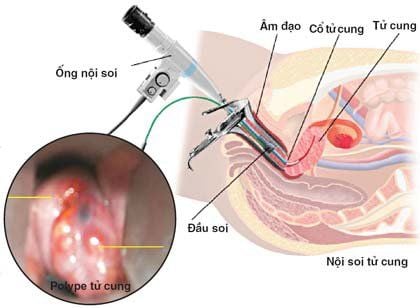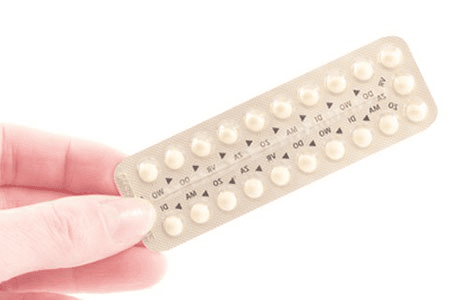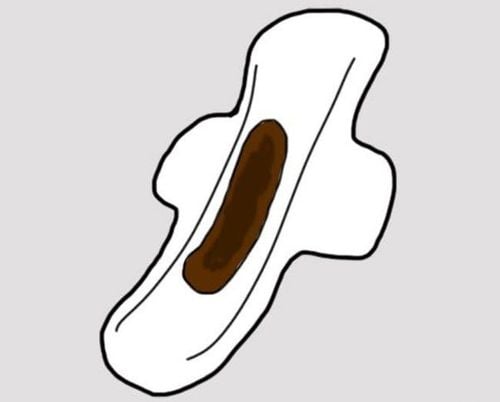This is an automatically translated article.
Endometriosis is a common condition in women. However, the symptoms and course of the disease are often different for each person. Many people do not feel any symptoms of the disease, or see very little. However, some people show obvious signs of the disease. If you are suspected of having endometriosis, you should make a diagnosis as soon as possible to promptly provide treatment options.1. What is endometriosis?
Normally, in a woman's uterus, there is always a layer of lining covering the surface. During menstruation, if conception does not take place (the egg does not meet the sperm), this lining will shed and lead to menstrual bleeding. However, the mechanism of action of this uterine lining for people with endometriosis will take place in an unusual way. Instead of flowing out of the body, menstrual blood and uterine tissues will flow back through the fallopian tubes and ovaries, depositing and growing on the outside of the uterus. This condition, if continued for a long time, can lead to internal bleeding and inflammation.Endometriosis occurs most commonly in women of reproductive age and it usually affects organs outside the uterus, including the ovaries, fallopian tubes, intestines, bladder, abdominal cavity and pelvic floor tissues. Endometriosis is a fairly benign disease and is not life-threatening. However, it can cause pain and discomfort for the sufferer, even leaving scar tissue and a high risk of infertility.

Lạc nội mạc tử cung xảy ra phổ biến ở phụ nữ độ tuổi sinh sản
2. Common symptoms of endometriosis
Endometriosis often causes some of the following symptoms:Pain occurs in the lower abdomen, lower back or pelvis. Pain during or after sex Severe abdominal pain during menstruation Pain when urinating or defecating Heavy bleeding during menstrual cycle Irregular periods Tired body Mood changes due to pain Bloating Constipation Indigestion Diarrhea Nausea Blood in stool and urine Vaginal bleeding after sex Infertility When you detect any abnormal signs in your body, it's best to see a doctor to Get counseling and appropriate treatment before the disease causes serious complications.

Đau bụng là dấu hiệu điển hình của lạc nội mạc tử cung
3. Factors that increase the risk of endometriosis
Endometriosis can affect most women of reproductive age, especially those aged 30 and over. The following are the main factors that may increase a woman's risk of endometriosis, including:Having a history of pelvic inflammatory disease Early menarche (before age 12) Having an abnormal uterus shape and size Have GERD Late menopause Have irregular periods Have high estrogen levels Family history (grandmother, mother, sister or sister) Never been pregnant
4. Diagnosis of endometriosis
When symptoms are suspected to be signs of endometriosis, women should immediately go to reputable medical facilities to perform diagnostic tests to accurately determine the status of the disease as well. as the cause of the disease. Common tests used to diagnose endometriosis include:Pelvic exam: this test helps the doctor detect problems such as cysts or scar tissue in the uterus. In addition, a pelvic exam can also help find the specific cause of abnormal uterine bleeding. However, this type of diagnostic test is not enough to conclude whether you have endometriosis or not. So your doctor may ask you to do some more tests. Ultrasound: Your doctor will use high-frequency sound waves to create an image of your reproductive organs. During the test, the technician may place an ultrasound-scanning wand, called a transducer, into your vagina or move it across your abdomen. Although ultrasound is not the best, most accurate way to detect endometriosis, it is very effective in finding ovarian cysts, a common problem in women with endometriosis. this disease. Magnetic resonance imaging (MRI): This test can create a clear picture of the inside of the patient's body without the need to use X-rays. Besides, through the MRI test, the doctor can can identify and provide a comprehensive assessment of the location and extent of endometriosis masses. Laparoscopy: when previous tests did not give an accurate conclusion whether you have endometriosis or not, at this time, your doctor will recommend laparoscopy. During the test, a small cut near the abdomen is made by a specialist, then a laparoscope is inserted to check for any signs of endometriosis. are not. When detecting signs of endometriosis, you should actively seek medical attention as soon as possible. An early diagnosis will help your doctor orient you to a reasonable treatment plan to effectively control the symptoms of the disease, and at the same time reduce the risk of serious complications from the disease.

Phương pháp nội soi giúp chẩn đoán lạc nội mạc tử cung
5. How to control endometriosis?
When suffering from endometriosis, the patient will have to face intense pain and extreme fatigue every time it is time to menstruate. To effectively control symptoms and prevent disease progression, you need to note the following:Follow a healthy diet, including lots of green vegetables and low in fat Do not use stimulants , containing alcohol such as beer, wine. These substances can make the symptoms of endometriosis worse. Stay hydrated throughout the day. Stay calm and optimistic. Take a bath or warm compress to ease the pain of contractions. tighten pelvic muscles Exercise regularly, you can choose exercises that are suitable for your ability, such as yoga, walking, jogging, cycling,... You should put a pillow in back of the knee while lying down Seek other therapies such as biofeedback or relaxation techniques. In order to help customers detect and treat other gynecological diseases early, Vinmec International General Hospital has a basic gynecological examination and screening package, which helps customers detect inflammatory diseases early and help treat diseases. Easy, inexpensive treatment. Screening detects gynecological cancer (cervical cancer) early even when there are no symptoms.
Basic gynecological examination and screening package for female customers, has no age limit and may have the following symptoms:
Abnormal vaginal bleeding Having menstrual problems: irregular menstrual cycle, irregular menstrual cycle Irregular vaginal discharge (smell, different color) Vaginal pain and itching Female clients have several risk factors such as poor personal hygiene, Unsafe sex, abortion,... Female customers have other symptoms such as: Abnormal vaginal discharge, itching, pain in the private area, abnormal vaginal bleeding.
Please dial HOTLINE for more information or register for an appointment HERE. Download MyVinmec app to make appointments faster and to manage your bookings easily.
Article reference source: Webmd.com












